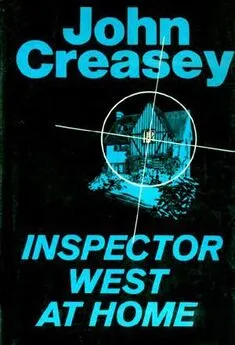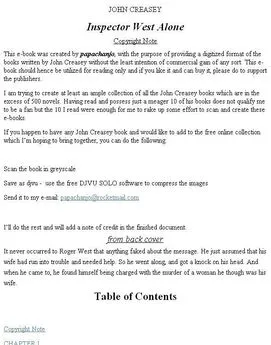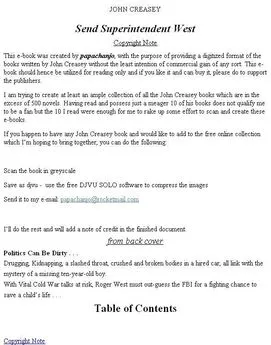John Creasey - Triumph For Inspector West
- Название:Triumph For Inspector West
- Автор:
- Жанр:
- Издательство:неизвестно
- Год:неизвестен
- ISBN:нет данных
- Рейтинг:
- Избранное:Добавить в избранное
-
Отзывы:
-
Ваша оценка:
John Creasey - Triumph For Inspector West краткое содержание
Triumph For Inspector West - читать онлайн бесплатно полную версию (весь текст целиком)
Интервал:
Закладка:
He paused for effect.
He appeared slightly disappointed at the stony reception of his news; he glanced from Roger to Chatworth and back again, and for the first time he showed some signs of disquiet. When he went on, it was in a harder voice.
“I am afraid that Warrender was behind these vicious crimes which were committed partly to cover up the fact that he had persuaded my wife to commit perjury, partly to be able to blackmail me at a later date. It seems evident to me now that my wife’s ex-fiance, Tony Brown, knew of that. Did you ever suspect that he was murdered , gentle- men?”
Roger felt sick.
“It did occur to us,” Chatworth said, heavily.
“I am afraid it is true, too.” Raeburn stood up and began to pace the room. “There is another thing. Tenby accused me of luring him to Aldgate the other evening, so that he would be framed—I quote him—for the attack on die policeman Peel. I accused Warrender of this. He denied it, of course, but there was no doubt that Warrender was gravely troubled by Tenby’s visit, and by my suspicions. Mrs Beesley, Mr Melville, and I were talking about it most of the night.”
Melville, with a good counsel, could convince any jury of this story. Raeburn was actually giving a preview of his defence.
Now he thought it wise to seem on edge.
“You must try to understand the distress which I felt,” he went on, earnestly. “I had no proof, only suspicion, and Warrender tried to convince me that those suspicions were baseless.”
“What made you come here now?” Roger forced himself to ask.
“Mrs Beesley telephoned me only a little while ago, and told me that Warrender had left the flat by the fire escape, last night, although I had ordered him to stay there until I returned.” So Raeburn was going to pretend that he did not know of Warrender’s arrest. “Airs Beesley is a very- shrewd woman, as no doubt you know, and she had been keeping a watchful eye on him for some time. She found a slip of paper in his coat last night—yes, she entered his room, and searched his pockets while he was asleep. The note makes it clear that Warrender and Tenby were planning this blackmail together. Would you like to know my final conclusions, gentlemen?”
“Very much,” said Roger, heavily.
“I think that Warrender has been using my name and my companies as a cover for extensive criminal operations.” Raeburn stood in front of Chatworth; his eyes were flashing, a most plausible imitation of a man in great distress. “I think that I have been completely deceived by a very clever rogue. Mrs Beesley suspected this some time ago, but wanted to be sure before she spoke. It seems evident that Warrender has reason to fear that his activities would be discovered. He was afraid that, if I were convicted of manslaughter, the police would investigate my affairs and, necessarily, his. I think he created a situation which eventually grew too big for him, and in desperation resorted to murder, and to hiring dangerous criminals to cover his tracks.
“You will ask what grounds I have for these suspicions.
I can only say—”Raeburn hesitated, then threw up his hands. “I can only say that the facts are clear to me now that I have been through my books. Warrender has been robbing me of huge sums. He had access to my banking accounts, and you will find that the figures speak for themselves. I know that I was wrong to trust him, but that is not the point now. I did trust him.” Raeburn spoke as if he were righteousness itself. “Gentlemen, I want you to make the fullest inquiry into my affairs wherever Warrender has been connected with them. I want the whole truth to come out. No matter how hurtful, I will face it. Warrender’s departure from the flat seems to me an admission of guilt. I want you to find him, too; he may have made plans to leave the country.”
“That’s possible,” Chatworth grunted, as if he had to make some contribution.
“I can only hope you will get results quickly,” Raeburn went on, briskly. “I really cannot carry on working until everything is known.” He put his hand into his pocket, drew out a key case, and dropped it on to the desk. “These are the keys to my safe at the flat, and to my strong room at the company offices. You may examine everything at your leisure. No doubt you expect Warren- der to try to wriggle out of this, and no doubt he will try to smear me with his own dirt, but—”
“Mr Raeburn,” Roger interrupted, in a deceptively quiet voice, “this isn’t going to work out quite as you expected. There’s something I don’t think you know. Warrender failed to kill your wife. He is now under arrest, charged with attempted murder. Your wife—”
Raeburn put out a hand on a chair to steady himself.
“You mean he tried to murder Eve?” he cried. “He wanted to kill fun’ to stop her from saying anything that might harm him. She—she isn’t hurt?” He jumped forward, gripping Roger’s arm. “Tell me that she isn’t hurt.”
Did he really think he could get away with all this? Could he?
A telephone bell rang on Chatworth’s desk, breaking the tension. Chatworth picked up the instrument, growled: “Chatworth,” and then actually gasped. “No!” Roger was watching Raeburn, and saw the momentary glint of triumph in his eyes.
Chatworth barked: “Who’d seen him? . . . Melville? . . . Yes, I see.” He rang off, and stared at Roger who was at screaming pitch.
“No doubt you expected this, Mr Raeburn,” he said. “Your solicitor visited Warrender in his cell. After he had left, Warrender died of potassium of cyanide poisoning. It appears to have been contained in a false heel of his shoe.”
“Why, that is terrible,” Raeburn said, and it sounded like a song of triumph.
“Whether Melville got the cyanide to him, whether it was murder or suicide, I don’t think we’ll ever know,” Roger said, bleakly. “I do know that Raeburn’s story will stand up in court, now. We still can’t charge him.”
That afternoon, Joe volunteered a statement. In it War- render was shown as the man who had hired him to commit all his crimes—against Katie Brown and against Brown himself.
Their only remaining hopes were Tenby and Eve. Whatever Eve knew, she could not be forced into the witness box; so Tenby, still at Reading, was the one hope.
That afternoon, Tenby was rushed to the Royal Berkshire Hospital, but died before he got there—of morphine poisoning.
CHAPTER XXV
THE TRUTH ABOUT JOE
GET ME Reading Police Headquarters,” Roger ordered, soon after he heard of Tenby’s death, and put the receiver down. “I think I’ve got a line, sir,” he said to Chatworth, very quietly. “Tenby came out of Raeburn’s flat carrying a box of chocolates, and I always thought that was odd. I’ll ask Reading to find that box; it’s probably at the cottage. If the post-mortem shows chocolate and morphine in the stomach, we can act.”
“You’d still have to prove that Raeburn poisoned them.”
“Even proving he bought or could have touched them will be a help. He might have fingered the box, too; and one fragmentary print on one chocolate would do the trick. We know he’s our man; all we need is a break to push him over.”
The telephone bell rang.
“Excuse me, sir . . . Oh, yes, Turnbull.”
Roger listened to Turnbull, who was obviously in one of his rare moments of excitement.
“ Now I’ve got something for you,” he said. “I’ve traced Ma Beesley’s eldest son.” There was a long pause and Roger could have shouted at him. “A gentleman named Joe,” he finished, gloatingly.
“Joe!”
“Joe,” Turnbull crowed. “He deserted from the Army, and has been dodging about the East End for years. And I’ve got something even better.”
“You couldn’t have.”
“Couldn’t I? This Joe’s been in touch with Ma Beesley—a landlady at the house he stayed at described her to a T. They’ve met within the last month.”
“I’m going to see Joe, right away,” said Roger, softly. “And pray for results from the p.m. on Tenby.”
The post-mortem report came through an hour later: Roger read it with increasing excitement. There was chocolate in Tenby’s stomach, with a strong concentration of morphine.
The box of chocolates had been found in his luggage, and each chocolate analysed; several contained morphine which had been injected into them.
“Get every chocolate tested for prints,” urged Roger. “Get every one photographed and blown up; we’ve got to get a fingerprint.”
Raeburn stayed in Reading until Eve was taken away from The King’s Arms by the police. On the return journey he looked very grave, and when he reached Park Lane, he found newspapermen and photographers waiting. After he had faced the battery of flashlights, and been asked for an interview, he shook his head slowly.
“I’m sorry, boys. This has been a gruelling time for me, and I’d rather not say anything just now.” He resisted all their pressure, waved his hat, gave rather a melancholy smile, and went up in the lift.
Ma Beesley opened the door of the flat.
“Welcome back, Paul,” she said, and stood aside for him to pass. She showed her ugly teeth in a grin as she closed the door. “Maud’s out,” she went on, “so we’re here on our own. Everything’s all right, then?”
The grave look had vanished from Raeburn’s face. He was grinning, and with almost boyish glee took her face between his hands, and kissed her soundly. “Everything’s fine, Ma! We’re going to get away with it, thanks to you and Abel.”
“Abel’s decided not to come and see us for a day or two,” Ma told him, and watched him very carefully. “There’s only one thing I don’t get, Paul. How did you manage to kill Tenby?”
“He was too fond of chocolates,” Raeburn gloated. “I gave him a big box before he left here, with doped ones in the bottom layer. I knew he wouldn’t eat them until he got to the cottage.”
Ma said: “Very smart, I agree, but supposing he’d eaten the doped ones too soon ?”
“Would it really have mattered?” asked Raeburn. “The police would have felt sure he was murdered; now they think it was suicide—that’s the only difference. I wanted him dead, and wanted Warrender to attack Eve. He was close on her heels, and even if she’d found Tenby dead, Warrender would have gone in to kill her; the police were bound to be at hand to catch him red-handed—as they did.”
“Supposing he had killed her, Paul?”
“As you’d telephoned West and warned him to watch Eve, I didn’t think there was much risk,” said Raeburn, carelessly. “If he had—” he shrugged. “Oh, forget it. You’ve done magnificently, Ma, a lot of credit’s due to you.”
“I even managed to convince you that Eve is loyal,” said Ma, “and I let poor George think I agreed with him about killing her. But you thought the whole thing out, Paul, I have to admit that. Did you have it in mind when you ran over Halliwell?”
“Oh, not as far back as that,” Raeburn admitted. “It was when I was in the dock, realizing that it might catch up with me sometime, that I began to plan a way out. The obvious thing was to put the blame on George. Only you and Tenby could have disproved it, and I knew I could rely on you.”
“I’ve never really liked George,” Ma wheezed.
Raeburn was looking dreamily at the door. “Yes, it all began while I was in the dock. I wonder what West would say to that! It was a remark you made about your son Joe being on the run from the Army authorities which gave me the idea of letting him do some work that Tenby would be blamed for, too. Obviously, that would sow suspicion between Tenby and George—and be the real beginning. The details worked themselves out as we went along. When Tenby murdered Tony Brown, I could see that it was coming along nicely. Bill Brown nearly upset the applecart, but you and Joe were equal to the occasion, Ma! By going after Bill Brown, letting himself be caught, and naming Warrender on the day agreed, Joe put the finishing touch to everything. And you did remarkably well when you interviewed Eve; you certainly proved her loyalty. I had to be quite sure of that.”
Читать дальшеИнтервал:
Закладка:










